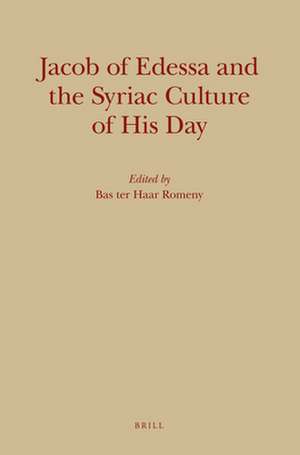Jacob of Edessa and the Syriac Culture of His Day: Monographs of the Peshitta Institute, cartea 18
Autor Bas Ter Haar Romenyen Limba Engleză Hardback – 23 dec 2008
Preț: 742.72 lei
Preț vechi: 905.75 lei
-18% Nou
Puncte Express: 1114
Preț estimativ în valută:
142.16€ • 154.47$ • 119.50£
142.16€ • 154.47$ • 119.50£
Carte indisponibilă temporar
Doresc să fiu notificat când acest titlu va fi disponibil:
Se trimite...
Preluare comenzi: 021 569.72.76
Specificații
ISBN-13: 9789004173477
ISBN-10: 9004173471
Pagini: 311
Dimensiuni: 155 x 235 x 23 mm
Greutate: 0.68 kg
Editura: Brill
Colecția Brill
Seria Monographs of the Peshitta Institute
ISBN-10: 9004173471
Pagini: 311
Dimensiuni: 155 x 235 x 23 mm
Greutate: 0.68 kg
Editura: Brill
Colecția Brill
Seria Monographs of the Peshitta Institute
Cuprins
Biography
Alison Salvesen (Oxford), ‘Jacob of Edessa’s Life and Work. A Biographical Sketch’
Robert Hoyland (St Andrews), ‘Jacob and Early Islamic Edessa’
Jacob as a historian and correspondent
Witold Witakowski (Uppsala), ‘The Chronicle of Jacob of Edessa’
William Adler (Raleigh, NC), ‘Jewish Pseudepigrapha in Jacob of Edessa’s Letters and Historical Writings’
Jan van Ginkel (Leiden), ‘Greetings to a Virtuous Man: The Correspondence of Jacob of Edessa’
Jacob as a jurist
Herman G.B. Teule (Nijmegen), ‘Jacob of Edessa and Canon Law’
Konrad D. Jenner (Leiden), ‘The Canons of Jacob of Edessa in the Perspective of the Christian Identity of His Day’
Jacob as an exegete and reviser of the Peshitta
Richard J. Saley (Harvard), ‘The Textual Vorlagen for Jacob of Edessa’s Revision of the Books of Samuel’
Alison Salvesen (Oxford), ‘Jacob of Edessa’s Version of 1-2 Samuel: Its Method and Text-Critical Value’
Bas ter Haar Romeny (Leiden), ‘Jacob of Edessa on Genesis: His Quotations of the Peshitta and his Revision of the Text’
Jacob as a grammarian and translator
The late Rafi Talmon, ‘Jacob of Edessa the Grammarian’
Lucas Van Rompay (Durham, NC), ‘Jacob of Edessa and the Sixth-Century Syriac Translator of Severus of Antioch’s Cathedral Homilies’
Jacob as a philosopher
Henri Hugonnard-Roche (Paris), ‘Jacob of Edessa and the Reception of Aristotle’
Marina Wilks (Exeter), ‘Jacob of Edessa’s Use of Greek Philosophy in his Hexaemeron’
Jacob and the liturgy
Baby Varghese (Kottayam), ‘The Anaphora of Saint James and Jacob of Edessa’
Bibliography
Dirk Kruisheer (Amsterdam), ‘A Bibliographical Clavis to the Works of Jacob of Edessa (Revised and Expanded)’
Indexes
Alison Salvesen (Oxford), ‘Jacob of Edessa’s Life and Work. A Biographical Sketch’
Robert Hoyland (St Andrews), ‘Jacob and Early Islamic Edessa’
Jacob as a historian and correspondent
Witold Witakowski (Uppsala), ‘The Chronicle of Jacob of Edessa’
William Adler (Raleigh, NC), ‘Jewish Pseudepigrapha in Jacob of Edessa’s Letters and Historical Writings’
Jan van Ginkel (Leiden), ‘Greetings to a Virtuous Man: The Correspondence of Jacob of Edessa’
Jacob as a jurist
Herman G.B. Teule (Nijmegen), ‘Jacob of Edessa and Canon Law’
Konrad D. Jenner (Leiden), ‘The Canons of Jacob of Edessa in the Perspective of the Christian Identity of His Day’
Jacob as an exegete and reviser of the Peshitta
Richard J. Saley (Harvard), ‘The Textual Vorlagen for Jacob of Edessa’s Revision of the Books of Samuel’
Alison Salvesen (Oxford), ‘Jacob of Edessa’s Version of 1-2 Samuel: Its Method and Text-Critical Value’
Bas ter Haar Romeny (Leiden), ‘Jacob of Edessa on Genesis: His Quotations of the Peshitta and his Revision of the Text’
Jacob as a grammarian and translator
The late Rafi Talmon, ‘Jacob of Edessa the Grammarian’
Lucas Van Rompay (Durham, NC), ‘Jacob of Edessa and the Sixth-Century Syriac Translator of Severus of Antioch’s Cathedral Homilies’
Jacob as a philosopher
Henri Hugonnard-Roche (Paris), ‘Jacob of Edessa and the Reception of Aristotle’
Marina Wilks (Exeter), ‘Jacob of Edessa’s Use of Greek Philosophy in his Hexaemeron’
Jacob and the liturgy
Baby Varghese (Kottayam), ‘The Anaphora of Saint James and Jacob of Edessa’
Bibliography
Dirk Kruisheer (Amsterdam), ‘A Bibliographical Clavis to the Works of Jacob of Edessa (Revised and Expanded)’
Indexes
Notă biografică
Bas ter Haar Romeny, Ph.D. (1997), Leiden University, is Professor of Old Testament and Eastern Christianity at Leiden University. He has published extensively on the biblical text and the history of its interpretation, including A Syrian in Greek Dress (Peeters, 1997) and The Peshitta: Its Use in Literature and Liturgy (Brill, 2006).
Recenzii
"Le volume s' ouvre par une esquisse biographique de Jacques, où A. Salvesen introduit au contexte historique et aux diverses facettes de l'oeuvre que traitent ensuite, l'une après l'autre, les spécialistes les plus autorisés de chaque discipline: histoire et épistolographie (W. Witakowski, W. Adles, J. van Ginkel), droit canon (H.G.B. Teule, K.D. Jenner), exégèse et révision du texte biblique (R.J. Saley, A. Salvesen, B. ther Haar Romeny), grammaire (R. Talmon) et traduction (L. van Rompay), philosophie et science (H. Hugonnard-Roche, M. Wilks) et liturgie (B. Varghese)."
Isabelle Isebaert-Cauuet (Le Museon)
Isabelle Isebaert-Cauuet (Le Museon)














